Why Does Milk Bother Me?
On this page:
What do I need to know about lactose intolerance?
Lactose intolerance means that you cannot digest foods with lactose in them. Lactose is the sugar found in milk and foods made with milk.

These foods contain lactose.
[Top]
Should I worry about lactose intolerance?
No. Lactose intolerance is not serious. You should feel better soon if you eat less food with lactose or if you use products that help you digest lactose.

Drink less milk because it has lactose in it.
[Top]
Why does my body have trouble digesting lactose?
You cannot digest lactose because you do not have enough lactase enzyme. The small intestine needs lactase enzyme to break down lactose. If lactose is not digested, it can cause gas and stomach
cramps.
[Top]
How will I feel if I have lactose intolerance?
After eating foods with lactose in them, you may feel sick to your stomach.
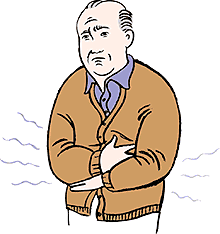
You may also have
- gas
- diarrhea
- swelling in your stomach
Some illnesses can cause these same problems. Your doctor can tell you if your problems are caused by lactose intolerance.
[Top]
How will my doctor check for lactose intolerance?
Your doctor might use one of these tests:
Blood and Breath Tests
You will drink a sweet drink with lactose in it. Then, your doctor will test your breath or blood for signs that you did or did not digest the lactose.
Stool Test
Your doctor can also find out if you digest lactose by testing your stool (bowel movement). The stool test is often used to check babies for lactose intolerance.
[Top]
What can I do about lactose intolerance?
You will need to eat less of all foods with
lactose. These foods include the following:
Foods made with milk
Lactose is in milk and all foods made with milk, like
- ice cream
- ice milk
- sherbet
- cream
- butter
- some cheeses
- cottage cheese
- yogurt

Prepared foods
Lactose is added to some boxed, canned, frozen, and other prepared foods, like
- bread
- cereal
- lunch meats
- salad dressings
- mixes for cakes, cookies, pancakes, and biscuits
- frozen dinners
[Top]
How will I know if lactose is in food?
Look for certain words on food labels. These words mean the food has lactose in it:
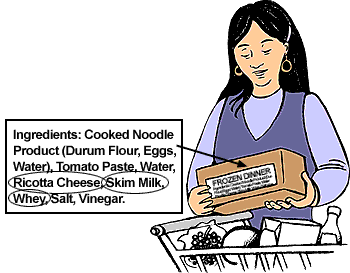
- butter
- cheese
- cream
- dried milk
- lactose
- milk
- milk solids
- powdered milk
- whey
[Top]
Can I eat any foods with lactose?
You may be able to eat a small amount of some foods with lactose. For example, you may be able to eat cheese or yogurt, but not
drink milk. Aged cheeses, like cheddar and Swiss, have very little lactose. Or you may be able to eat some prepared foods. To find
out if you can, try a small amount of the food and then see how you feel.
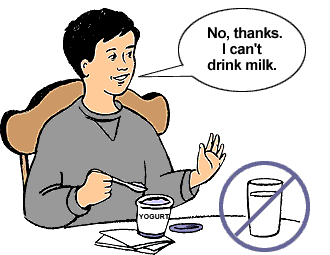
Some people can eat a little of certain foods that contain milk, but none of others.
[Top]
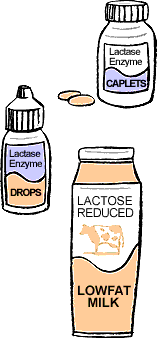
Can I take anything to help me digest lactose?
You can buy pills or drops at a drug or grocery store to help you digest lactose. They are
- Pills that you chew right before eating foods with lactose. These pills are called lactase enzyme caplets.
- A liquid that you add to milk before drinking. The liquid is called lactase enzyme drops.
You can also drink a special milk with less lactose in it. You can buy this milk at the grocery store. It is called lactose-reduced milk.
[Top]
What else do I need to know about diet?
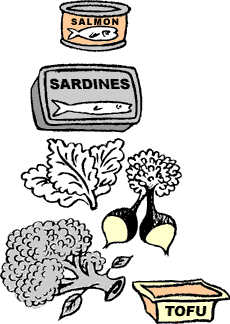 Drinking milk and eating foods made with milk are the most common ways to get calcium. Calcium is important for good health. If you cannot eat or drink these foods, you may need to eat other foods with calcium:
Drinking milk and eating foods made with milk are the most common ways to get calcium. Calcium is important for good health. If you cannot eat or drink these foods, you may need to eat other foods with calcium:
- canned salmon with bones
- sardines
- collard greens
- turnip greens
- broccoli
- tofu
Also, ask your doctor if you should take a calcium tablet every day.
[Top]
Points to Remember
- Eat fewer foods with lactose in them, like milk, some cheeses, and ice cream.
- Find out if you can eat small amounts of food with lactose.
- Read food labels to find out if a food has lactose in it.
- Use a special pill or liquid to help you digest foods with lactose.
- Eat enough foods with calcium, like broccoli.
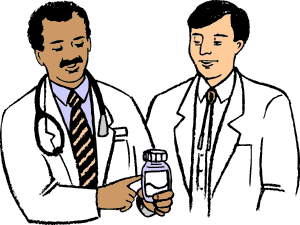 Taking a pill to help digest lactose is one way to deal with lactose intolerance.
[Top]
National Digestive Diseases Information Clearinghouse
2 Information Way
Bethesda, MD 20892–3570
Phone: 1–800–891–5389
TTY: 1–866–569–1162
Fax: 703–738–4929
Email: nddic@info.niddk.nih.gov
Internet: www.digestive.niddk.nih.gov
The National Digestive Diseases Information Clearinghouse (NDDIC) is a service of the National Institute of Diabetes and Digestive and Kidney Diseases (NIDDK). The NIDDK is part of the National Institutes of Health of the U.S. Department of Health and Human Services. Established in 1980, the Clearinghouse provides information about digestive diseases to people with digestive disorders and to their families, health care professionals, and the public. The NDDIC answers inquiries, develops and distributes publications, and works closely with professional and patient organizations and Government agencies to coordinate resources about digestive diseases.
Publications produced by the Clearinghouse are carefully reviewed by both NIDDK scientists and outside experts.
This publication is not copyrighted. The Clearinghouse encourages users of this publication to duplicate and distribute as many copies as desired.
NIH Publication No. 07–2751
February 2005
[Top]
|




